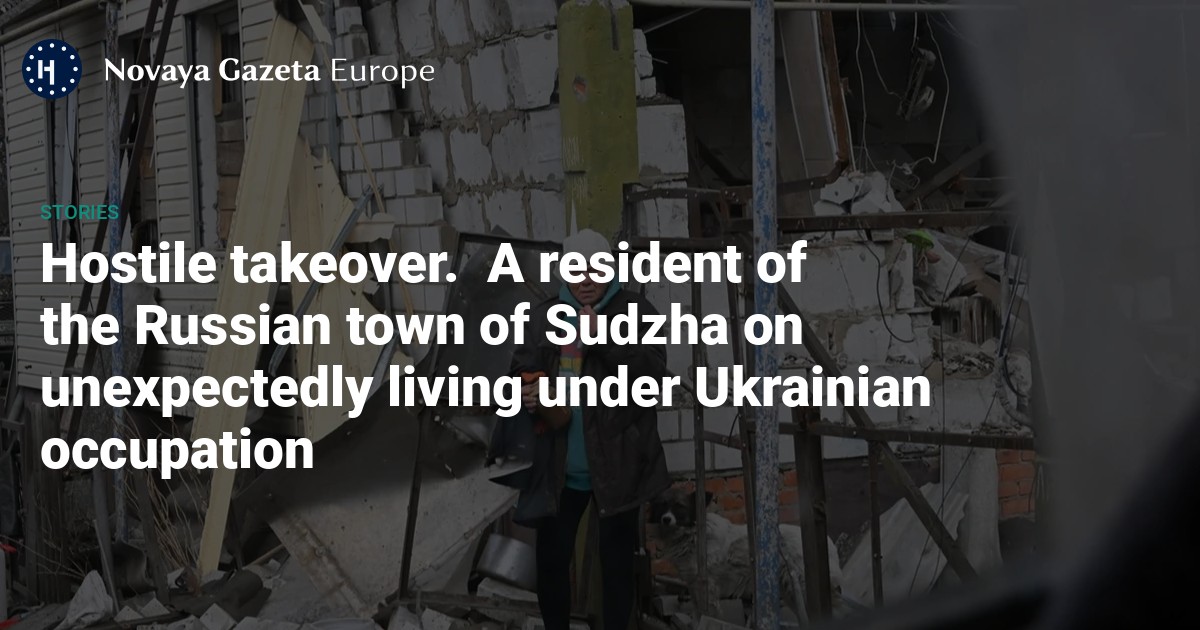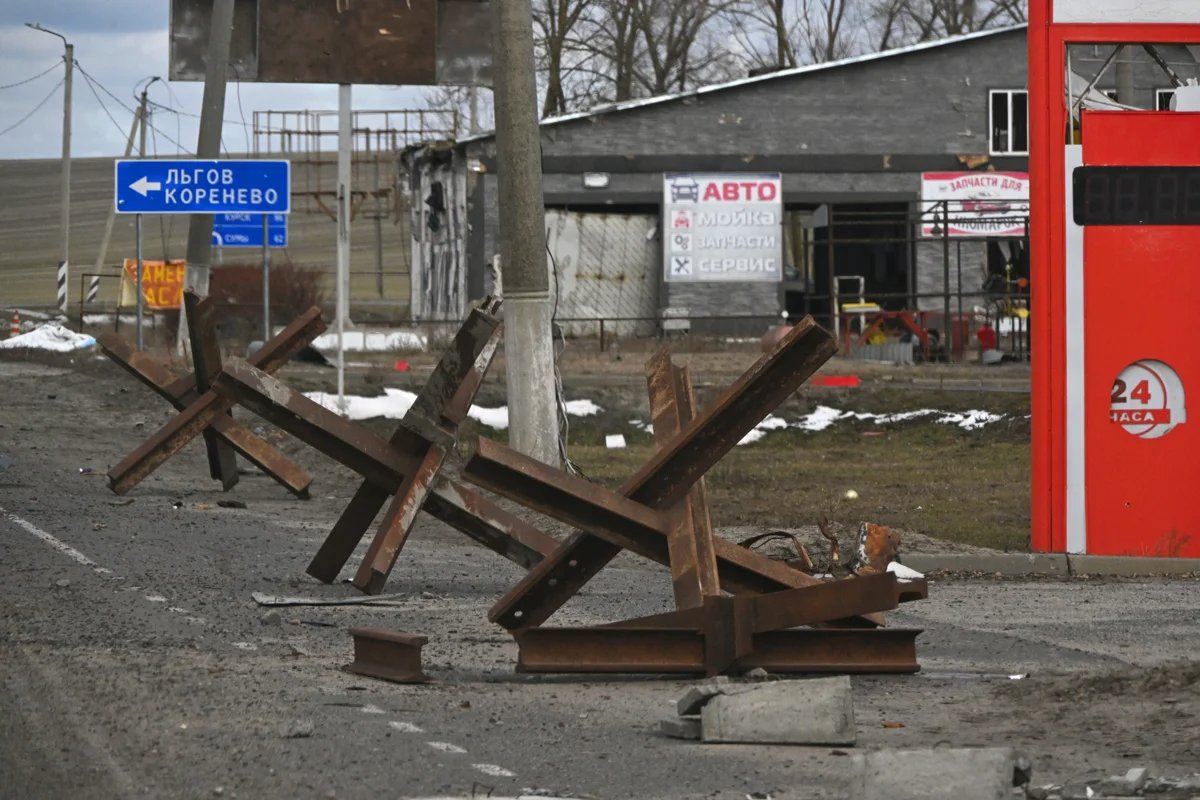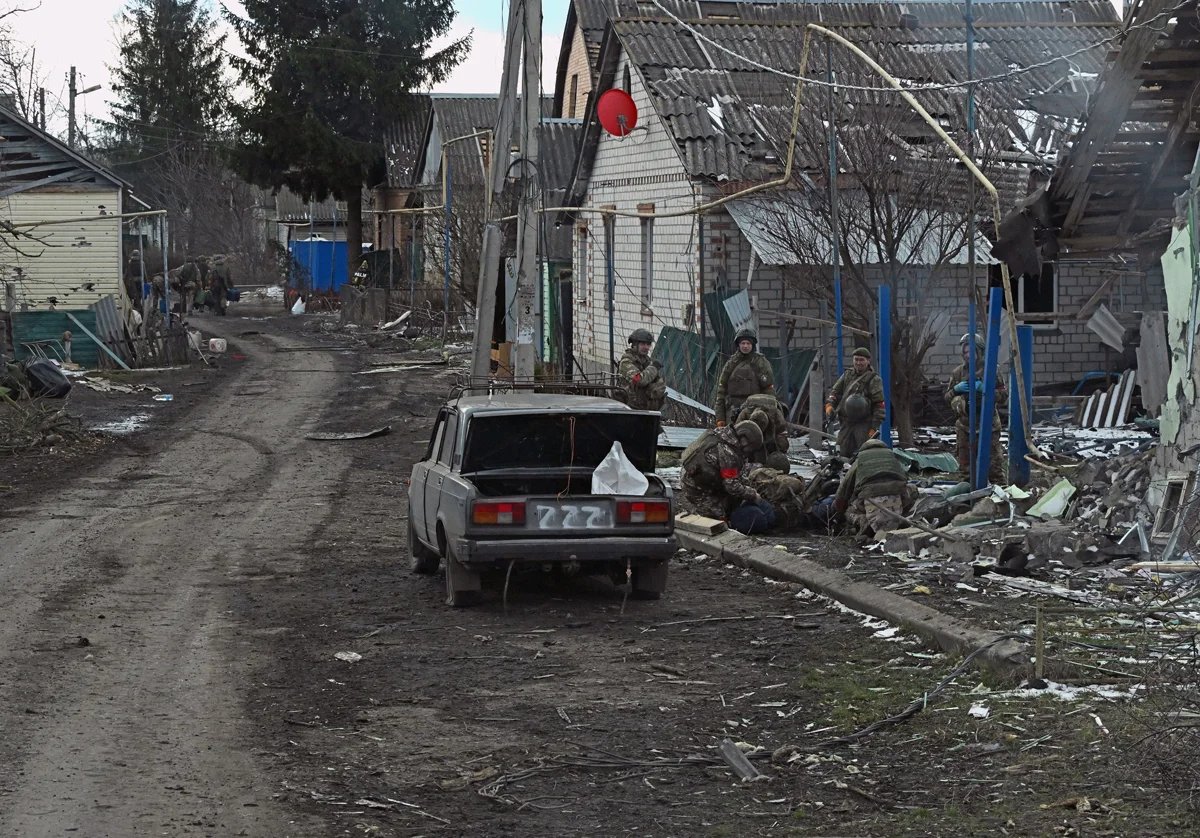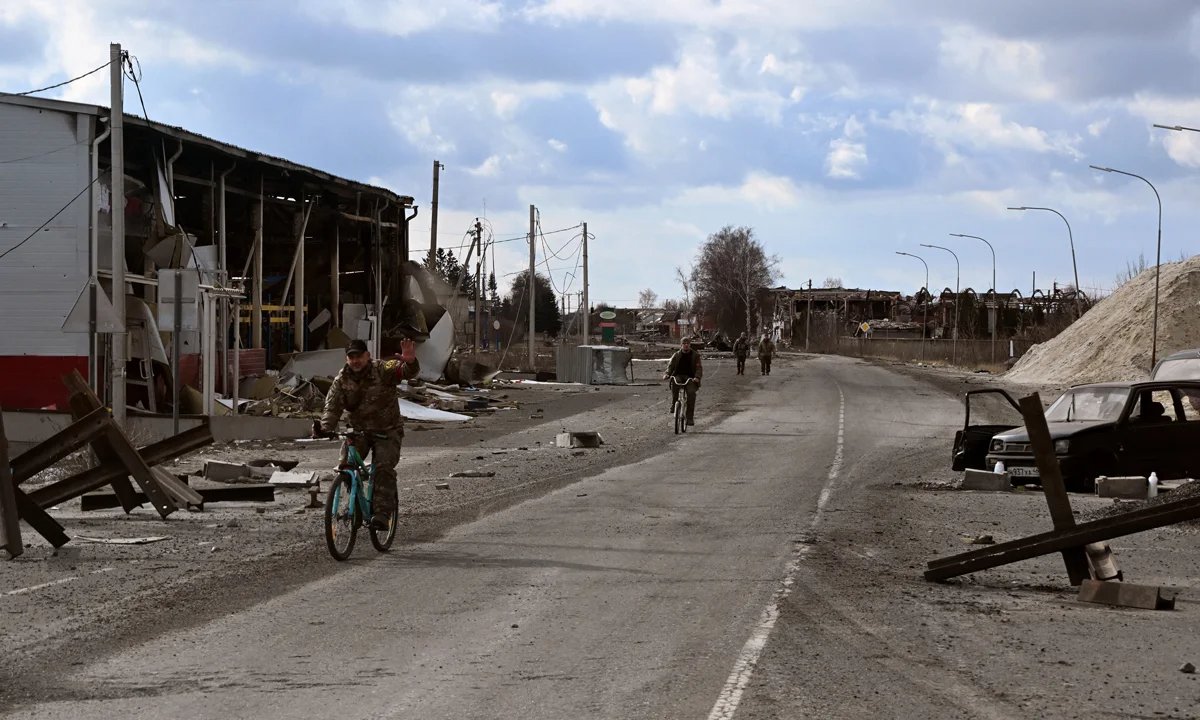



This time last year, the Armed Forces of Ukraine (AFU) launched a surprise incursion into Russia’s Kursk region, going on to occupy a significant part of it for seven months. A resident of Sudzha, the largest town to have fallen under AFU control, described his experienes of living under the Ukrainian occupation to Novaya Gazeta Europe.
“When Ukrainian troops occupied Sudzha in September, the people who had remained in the town were not particularly worried. Ukrainians were fellow Slavs, and wouldn’t behave like the Nazis. And we were right,” says Sudzha native Igor S., adding that the Ukrainian troops “weren’t violent and were actually fairly relaxed”.
“There was looting, of course. There’s no avoiding that in wartime. But only houses and apartments that were empty were targeted. First, they stole all the cars that had been abandoned in garages. Then they started on electronics and household appliances … If there was someone at home, they would take their mobile, but not touch the house.”
“From about the end of August, the Ukrainian soldiers began distributing food to those of us who hadn’t had time to leave Sudzha. They levelled with us and admitted that the food had been taken from shops in rural villages that had been wholly evacuated. But many residents of border villages didn’t have time to get to Russian[-controlled] territory and stayed in Sudzha. There was some sort of order there. There was no mass looting, they provided medical care, and they handed out food.”

Anti-tank traps at the entrance to Sudzha, 19 March 2025. Photo: Anatoly Zhdanov / Kommersant / Sipa USA / Vida Press
“We first understood what it meant to be in a combat zone in September 2024,” Igor says. “The Russian army tried to dislodge the Ukrainians from Sudzha. As someone who fought in two Chechen wars, I knew that the Russian artillery was trying to fire with pinpoint precision. They weren’t using Grad missiles … or cluster bombs. But it was still pretty bad being so close to the centre of the fighting.”
“At least I knew that the explosions and shots were far away. But I can only imagine what it must have been like for those who’d never been to war …I think many people were in a state of shock. Who was still in Sudzha, after all? … People who couldn’t leave their loved ones behind or … the elderly who didn’t have time to pack up their things and limp to the square where the evacuation buses were waiting. And when the Ukrainians had already occupied Sudzha, people who hadn’t managed to leave neighbouring villages came to the town. I’d say there were at least 2,000 people in Sudzha at the end of August 2024.”
“Life was pretty hard that winter,” Igor recalls. “Not because there was no food — the Ukrainians kept us supplied with the basics — but because many of those who remained in Sudzha didn’t want to move from their apartments to empty houses, as the Ukrainians suggested. The heating didn’t work, of course, and there was no hot or cold water. People had to go to the toilet outside, but many still stayed in those cold apartments. They made little stoves and cooked on them, and stayed in their homes. They knew that if they left them empty, they’d be stripped bare. After an operation by Russian forces in September, the AFU soldiers rotated. The new men … wanted to make some extra money too, of course. But they worked on a strict principle: if there was someone in a house or apartment, they wouldn’t touch it.”
“I knew I’d have to get through the winter somehow, so I was thinking about heating,” says Igor. “We have a fireplace in the house that works like a stove. You can heat the building and cook on it. But there was almost no firewood. I took a wheelbarrow and went to nearby empty houses. I was wheeling the wheelbarrow full of firewood, when I came across a Ukrainian patrol. ‘Stealing, are we?’ one soldier asked me. And I said, ‘Not stealing, surviving!’ They tutted and moved on.”
Igor says that 12 people died of illness in Sudzha that winter. In mid-January, the Ukrainian forces announced that they would be unable to provide medical care requiring specialist equipment or complex tests, but offered to organise medical evacuations to Russia via Belarus.
“Anyone wanting to leave Sudzha went to the boarding school,” says Igor. “A pre-revolutionary brick building that had a large basement where people could hide from shelling. Either a missile or a bomb hit the building on 1 February 2025. There were about 90 elderly people waiting to be evacuated in the building at the time. Eight people died.”
The AFU said it was a Russian glide bomb. The Russians said it was a Ukrainian missile.
In the aftermath of the school strike, Igor says that many of those left in Sudzha agreed to be evacuated to Russia via Belarus.
“Personally, I don’t think it was the Ukrainians,” Igor says. “There were Ukrainian police … and Ukrainian citizens in the building. … Secondly, there were AFU gun emplacements literally 100 metres from the school. The Ukrainians … installed a long-range howitzer there. So the Ukrainian missile version doesn’t add up. Why would the Ukrainians attack their own people? … Whereas it made sense for the Russians to strike the building.”
In the aftermath of the school strike, Igor says that many of those left in Sudzha agreed to be evacuated to Russia via Belarus.
“My family left Sudzha at the end of February,” Igor recalls. “But I stayed. … Because the Ukrainians said they would be leaving soon. And I understood that when they left, they would take everything with them. So I decided to stay to protect my house. As I said, the Ukrainians didn’t loot houses where people were living.”

Russian servicemen in Sudzha, 19 March 2025. Photo: Anatoly Zhdanov / Kommersant / Sipa USA / Vida Press
Sudzha came under intense Russian shelling on 8 March, according to Igor. “This time the Russians targeted the fortified gun emplacements with pinpoint precision. Whether it was thanks to reconnaissance drones … or satellite images … they hit almost all the Ukrainian emplacements.”
But the Ukrainian troops were in no rush to leave Sudzha. “On 11 March … I went to the commandant’s office,” says Igor. “I’d run out of food, and I was hoping to get something from the Ukrainians. I was halfway there when the explosions began. From the sound, I knew these were … Grads, which destroy everything within a certain radius. I remember thinking: ‘What are you doing? There are Russians here, and you’re killing us.’ And then it went dark.”
Igor woke up in hospital in Kursk. He learned later that he had been hit by a Russian shell. His arm had serious fractures and several shards of shrapnel had hit him in the abdomen. He was rescued by a retired nurse who lived nearby.
“She dragged me to her apartment,” Igor says. “She put a tourniquet on my arm to stop the bleeding and then wound her net curtains around my stomach, as she had no bandages. … I woke up in hospital in Kursk. … A nurse came up to me, smiled and said: ‘So you’ve woken up.’”
“I had three operations to remove small fragments [of shrapnel] from my stomach,” says Igor. “I’m grateful to the doctors in Kursk for saving me. But then the surgeon came and told me frankly that there were major problems with my arm … which they couldn’t treat there. But if it wasn’t treated now, there was a risk of sepsis … and death. So I signed a consent form for the arm to be amputated.”
As Igor was recovering in the intensive care unit after the operation, he was visited by someone from the military Prosecutor’s Office.
“I hadn’t yet recovered yet and was still getting used to having to live with one arm, when a … captain appeared with paperwork and said: ‘Sign this!’” Igor explains. “I said to him, ‘Did my physician give you permission to speak to me? And if he did, then why wasn’t my wife allowed to see me first, rather than some shit with a piece of paper? I lost an arm because of you, and you come here to boss me around?!’ The captain was gobsmacked and left. But the next day, a lieutenant colonel appeared. He was polite, but also tried to give me papers to sign. I pressed the emergency call button, a nurse came running in and I said I felt sick.”

Uniformed men cycle through Sudzha, 19 March 2025. Photo: Anatoly Zhdanov / Kommersant / Sipa USA / Vida Press
“Then I was transferred to a general ward for six,” says Igor. “Five were from Sudzha, and one was a professional soldier, most likely special forces. On 4 July, there was great fuss all of a sudden. It turned out they were expecting a visit from the new governor.”
“We weren’t told that he was going to come to our ward, but he did. He wished us good health, asked how the staff treated us, said Sudzha would be rebuilt and everything would go back to how it was before. I couldn’t resist and asked: ‘Will you give me my arm back, too?’ [Kursk Governor Alexander] Khinshtein looked at me, thought for a second, and then said: ‘There are prostheses that connect to nerve endings and don’t just serve as stumps, but can really become a part of you. I promise you, you will have one!’ Khinshtein left and we were given gifts — apples, bananas, tinned ham, orange juice and a packet of tea,” Igor continues.
“Impressed by his visit, I signed a waiver saying I had no claims against the Defence Ministry, but then I wondered if I’d made a mistake as I doubt the governor will keep his promise about the smart prosthesis. They’re only made in the West, and we won’t get them while there are sanctions. So I’ll probably have to get by with a stump after all.”
The Russian government has banned independent media. We were forced to leave our country in order to keep doing our job, telling our readers about what is going on Russia, Ukraine and Europe.
We will continue fighting against warfare and dictatorship. We believe that freedom of speech is the most efficient antidote against tyranny. Support us financially to help us fight for peace and freedom.
By clicking the Support button, you agree to the processing of your personal data.
To cancel a regular donation, please write to [email protected]
VPNovaya
Help Russians and Belarusians Access the Truth
